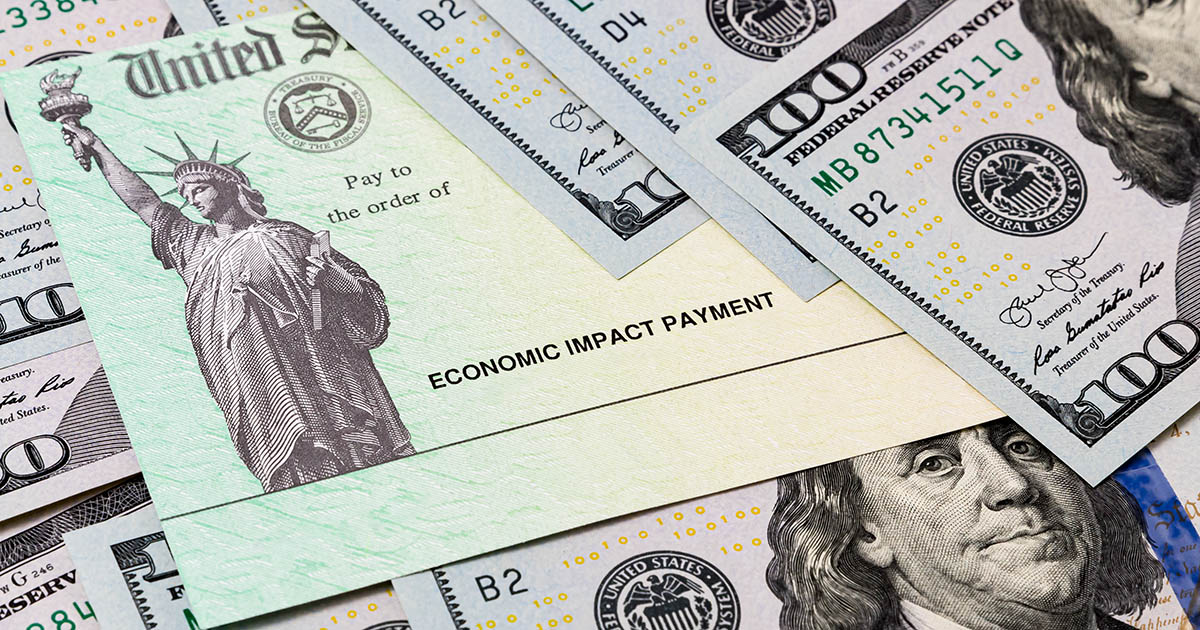
When are the Next Stimulus Checks Coming? Will You Get One?
March 12, 2021
 By Chris Jackson
By Chris Jackson
Assistant V.P. of Retail ServicesNow that the president has signed the $1.9 trillion “American Rescue Plan,” millions of Americans will receive a new wave of economic impact payments (aka stimulus checks).
The payments have been increased to $1,400 per person this time around, although fewer people are eligible to receive a check.
According to the IRS, the official payment date for direct deposits is set for Wednesday, March 17, although some people may see the payments hit their bank accounts before that point.
“Some Americans may see the direct deposit payments as pending or as provisional payments in their accounts before the official payment date,” the IRS announced late last week.
This is just the first wave, of course. For people receiving checks by mail, the payments can be expected to take longer to arrive.
Checking your online banking account is the quickest way to see if the bank has received your EIP direct deposit. Here’s what else we know about the third round of stimulus checks, including whether or not you're eligible:
How much will your stimulus check be?
The third stimulus checks generally amount to $1,400 for each person in your household, including any adult or child dependent. This includes college students, disabled and elderly adults (which is different from the previous rounds that capped the age at 16).
However, the payment amounts begin to draw down if your income is higher than a certain threshold (more on that below).
Who gets a third stimulus check?
You will get the full third stimulus check amount if:
- You are a single filer earning up to $75,000.
- You are a couple filing jointly with an income of up to $150,000.
- You are a head of household earning up to $112,500.
Remember, if you fully qualify, you will also get an extra $1,400 per dependent.
What if I make more than the limit?
If you make more than the amounts listed above, your check amount will begin to phase out as listed below:
|
$1,400 third stimulus check income limits
|
| |
AGI to receive full amount
|
AGI to phase out of payment
|
| Single tax filer |
$75,000 |
$80,000 |
| Head of household |
$112,500 |
$120,000 |
| Married, filing jointly |
$150,000 |
$160,000 |
Unlike the the previous two coronavirus relief packages, Americans' eligibility will phase out much quicker this time around. Single and joint couples with no dependents will experience a 28% phase-out rate, which means that they will receive $280 less for every $1,000 over the limit they earn. Married couples with one dependent will experience a 42% phase-out rate.
Will my third stimulus check be based on 2019 or 2020 income?
The third stimulus check will be based on the Adjusted Gross Income (AGI) on your latest tax return. This means that if you’ve already filed your taxes for 2020, then your AGI for 2020 will determine your eligibility; otherwise the IRS will use your 2019 income. You can find your AGI on your latest federal tax return (it's found on line 11 of the 2020 Form 1040 and on line 8b of the 2019 tax form).
When and how will stimulus payments be sent?
Any eligible taxpayer who has given the IRS their direct deposit information should see their third stimulus payment arrive automatically in their bank account, on or around March 17.
If you have not set up direct deposit with the IRS, you should receive a paper check or stimulus debit card in the mail — but it will take a bit longer. The last two rounds of physical stimulus checks were mailed a week or two after direct deposits began. It is assumed this will be the case with the third round.
Similar to the first two rounds of payments, taxpayers will be able to track the status of their payment with the IRS Get My Payment tool.
[Monitor up-to-the-minute activity on your accounts through online banking and the SNB Mobile App.]
What if I still haven’t received my first two stimulus checks?
If you still haven’t received your first or second stimulus checks, then you can claim a Recovery Rebate Credit on your 2020 tax return. This is located on line 30 of your 2020 Form 1040 or 1040-SR. You can then list the difference between the amount you were owed via the stimulus payments and the amount you received.
Will the third stimulus check affect my taxes?
No. Like the first two stimulus payments, the IRS has stated that you do not have to claim the stimulus check on your taxes. This means that your taxes for 2021 will not be increased and the money you receive won’t be taken away from your tax refund.
Was this article helpful?
We want to provide solutions that matter, when you need them most. Get the latest updates by subscribing to our email newsletter. And if you have any further questions, contact us today.